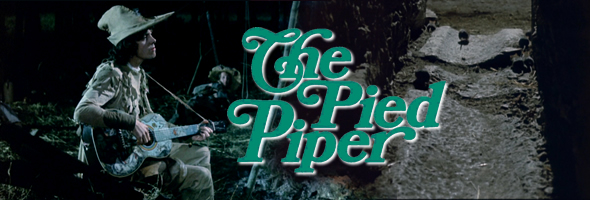
Color, 1972, 90 mins. 16 secs.
Directed by Jacques Demy
Starring Donovan, Donald Pleasence, John Hurt, Jack Wild, Diana Dors, Michael Hordern, Cathryn Harrison
Kino Lorber (Blu-ray & DVD) (US RA/R1 HD/NTSC),
Arte (France R2 PAL), Legend (US R1 NTSC) / WS (1.78:1) (16:9)
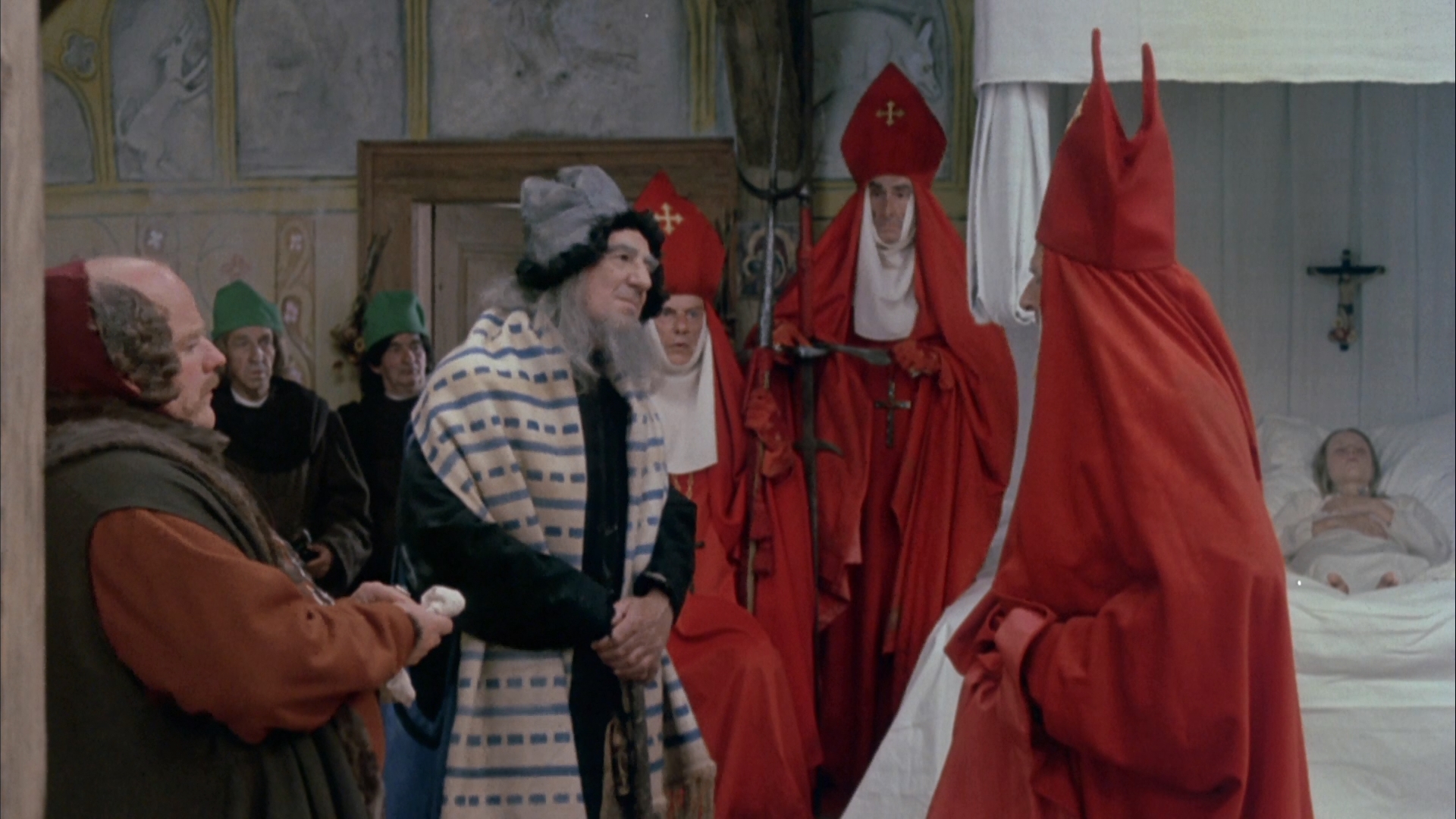
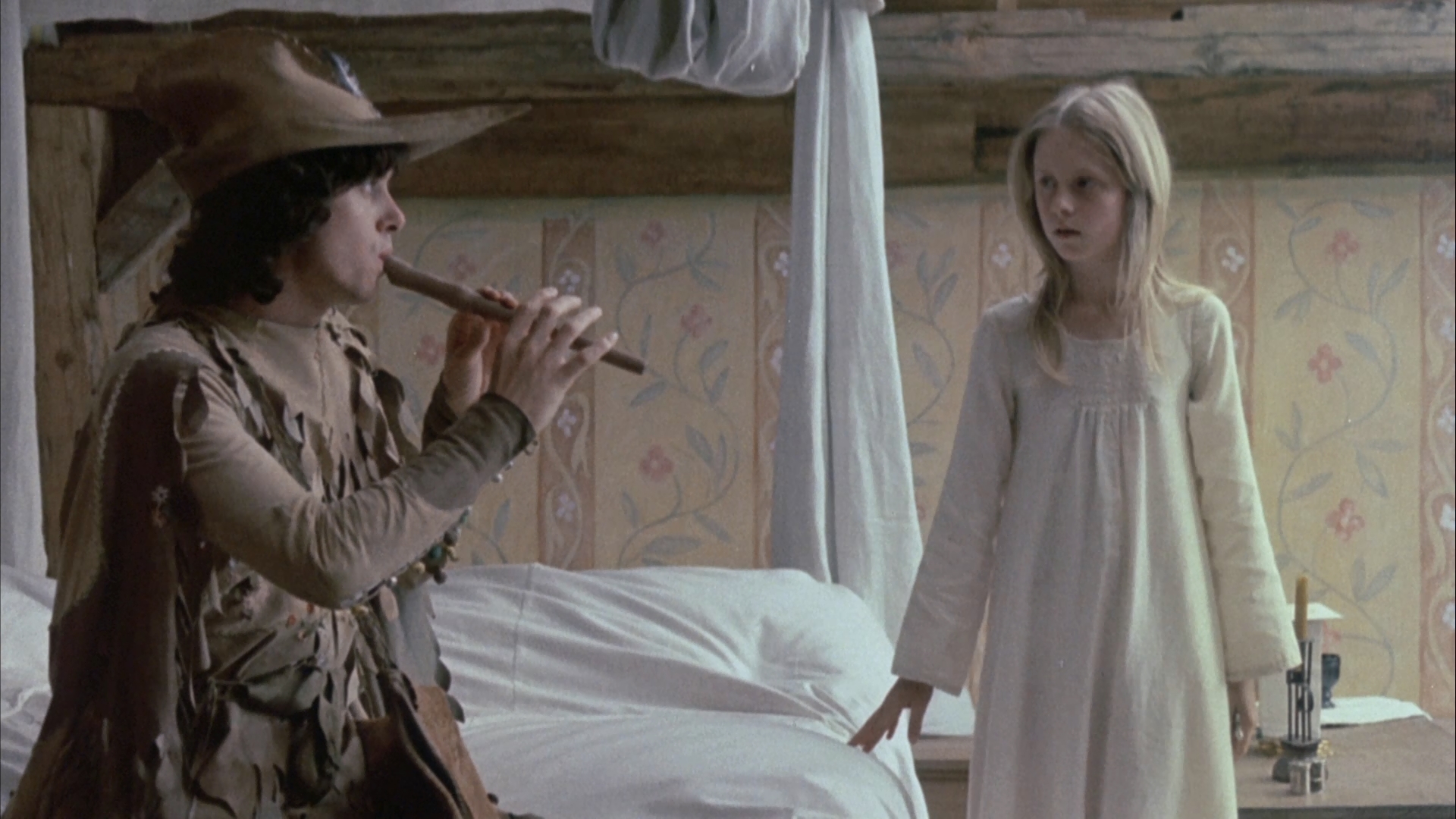 After the rousing success of his lavish musical fairy tale Donkey Skin, director Jacques Demy, helmer of the beloved The Umbrellas of Cherbourg, decided to take another crack at children's fantasy, this time in English. The Pied Piper, his adaptation of one of the most disturbing fairy tales pulls no punches with the source material, depicting a small medieval German town of Hamelin, the threat of a nearby plague terrifies the populace, particularly the dominant forces of the Catholic church. A traveling troupe of actors arrives at the barricaded town, which allows them in only after one of their party, a vagabond piper (Donovan), revives the mayor's ailing daughter, Lisa (Harrison), with a song heard through her bedroom window. However, their troubles are only beginning as the sniveling burgomaster (Pleasence) and his corrupt and irresponsible military-aspiring son Franz (Hurt) perform underhanded deals with the church to establish a papal-sanctioned war and a completely indulgent church based out of the town. On the other side of the moral spectrum, alchemist Melius (Hordern) and his artistic, crippled young assistant, Gavin (Oliver!'s Wild), become friendly with the actors. Gavin is nursing a crush on Lisa, who, despite having yet to reach adolescence, is engaged to marry Franz. When Lisa's doomed wedding arrives and the eventual influx of infected rats arrives, the powers that be arrange an unusual bargain with the piper which, as all fairy tale lovers know, is destined to end on a very melancholy note.
After the rousing success of his lavish musical fairy tale Donkey Skin, director Jacques Demy, helmer of the beloved The Umbrellas of Cherbourg, decided to take another crack at children's fantasy, this time in English. The Pied Piper, his adaptation of one of the most disturbing fairy tales pulls no punches with the source material, depicting a small medieval German town of Hamelin, the threat of a nearby plague terrifies the populace, particularly the dominant forces of the Catholic church. A traveling troupe of actors arrives at the barricaded town, which allows them in only after one of their party, a vagabond piper (Donovan), revives the mayor's ailing daughter, Lisa (Harrison), with a song heard through her bedroom window. However, their troubles are only beginning as the sniveling burgomaster (Pleasence) and his corrupt and irresponsible military-aspiring son Franz (Hurt) perform underhanded deals with the church to establish a papal-sanctioned war and a completely indulgent church based out of the town. On the other side of the moral spectrum, alchemist Melius (Hordern) and his artistic, crippled young assistant, Gavin (Oliver!'s Wild), become friendly with the actors. Gavin is nursing a crush on Lisa, who, despite having yet to reach adolescence, is engaged to marry Franz. When Lisa's doomed wedding arrives and the eventual influx of infected rats arrives, the powers that be arrange an unusual bargain with the piper which, as all fairy tale lovers know, is destined to end on a very melancholy note. 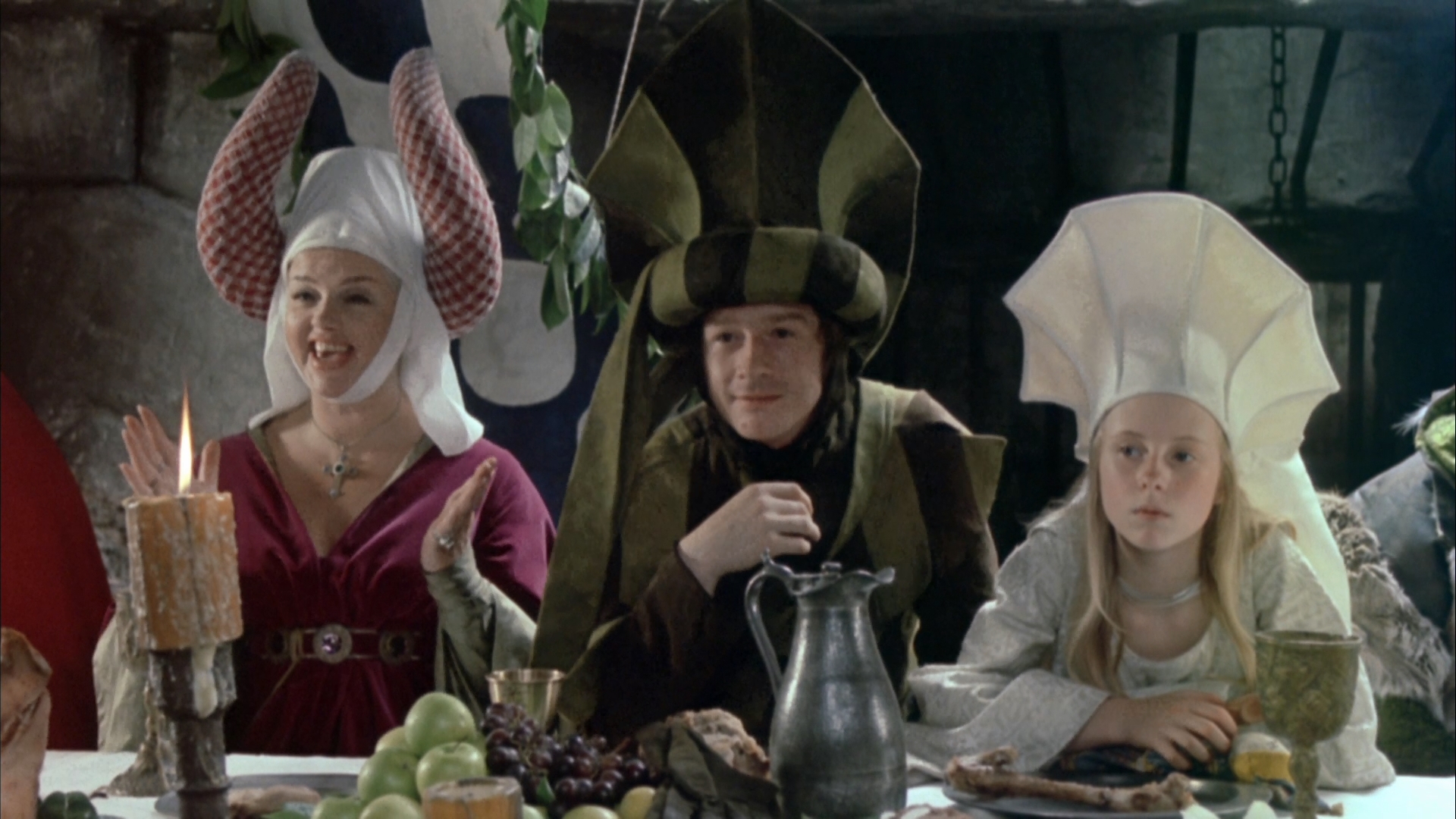
The closest thing to a horror film in the Demy canon, this was also an uncharacteristically grim and brutal offering from Goodtimes Enterprises, a U.K.-based production company during the 1970s whose films like Performance, Lisztomania, and That'll Be the Day were largely conceived as star vehicles for music performers. The 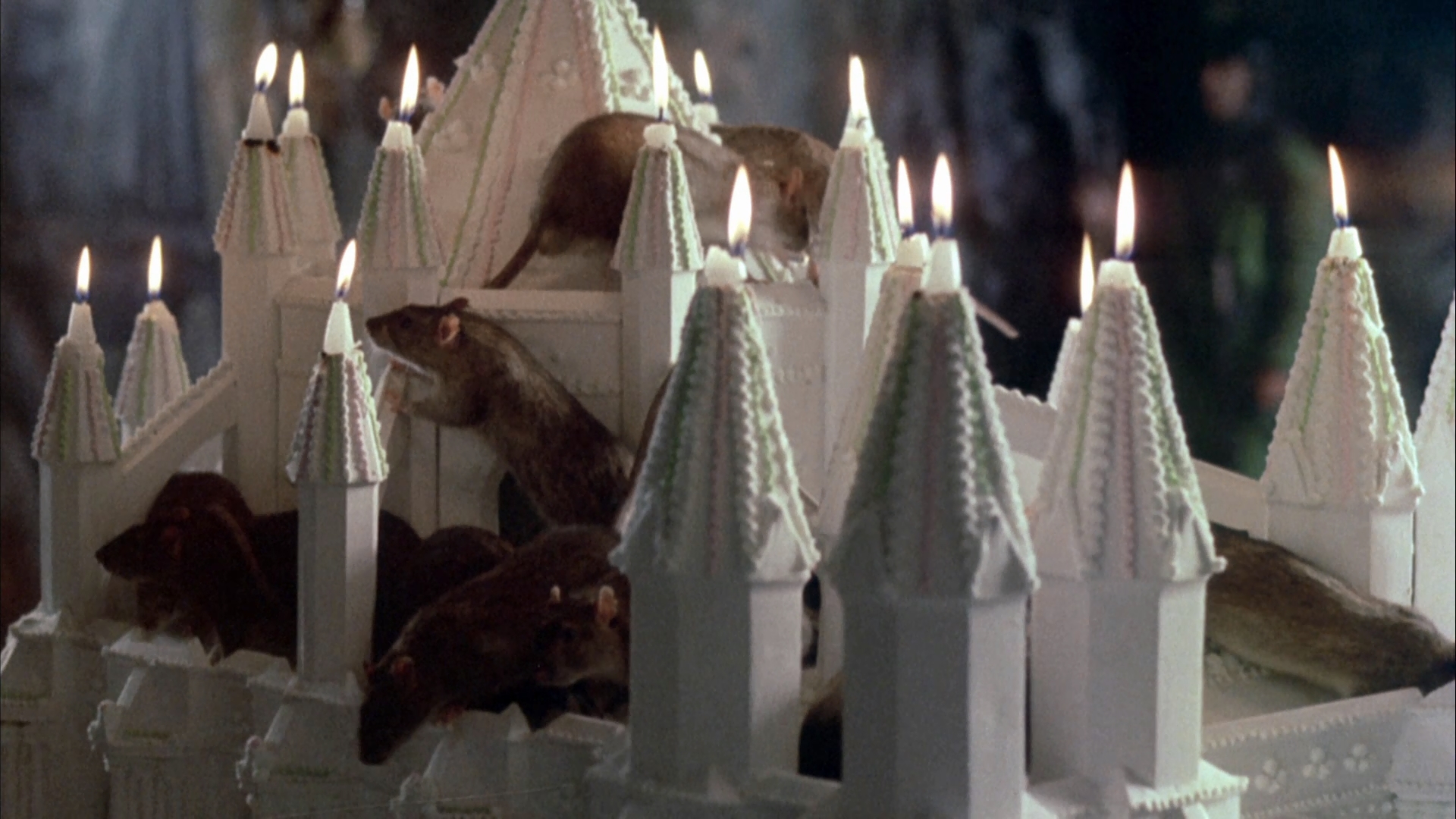 big name in this particular film is Donovan, a Scottish folk-pop singer best known for 1960s standards like "Hurdy Gurdy Man," "Atlantis," and "Sunshine Superman." His presence in the film is something of a sticking point for many modern viewers, but in fact the small numbers of spare, haunting ditties he performs in the film work well with the period setting, and while he'll never be confused with a master thespian, he acquits himself well enough with his one-dimensional role. (As with his previous English film, Model Shop, Demy did not use regular composer Michel Legrand, but the music here is still very potent and deserves a soundtrack release someday. ) The real acting demands rest with pros like Pleasence, Hurt, and Hordern, who chew into their meaty roles with gusto.
big name in this particular film is Donovan, a Scottish folk-pop singer best known for 1960s standards like "Hurdy Gurdy Man," "Atlantis," and "Sunshine Superman." His presence in the film is something of a sticking point for many modern viewers, but in fact the small numbers of spare, haunting ditties he performs in the film work well with the period setting, and while he'll never be confused with a master thespian, he acquits himself well enough with his one-dimensional role. (As with his previous English film, Model Shop, Demy did not use regular composer Michel Legrand, but the music here is still very potent and deserves a soundtrack release someday. ) The real acting demands rest with pros like Pleasence, Hurt, and Hordern, who chew into their meaty roles with gusto.
The dark undertones of the original story (made famous by the likes of the Brothers Grimm and Robert Browning), essentially a metaphor for the loss of multiple children to a disease epidemic or tragic accident (elaborated upon most tantalizingly in Atom Egoyan's The Sweet Hereafter), are certainly not sugarcoated in this version, which presents unflinching depictions of the ravages of the plague, a horrific wedding banquet scene with hordes of rats bursting from a grandiose wedding cake, and a harrowing climactic burning at the stake for one sympathetic character which left many unprepared viewers shell-shocked. The end result would actually make a perfect double bill with Ken Russell's The Devils from the previous year, as they share very similar storyline trajectories, visual schemes, and pessimistic views 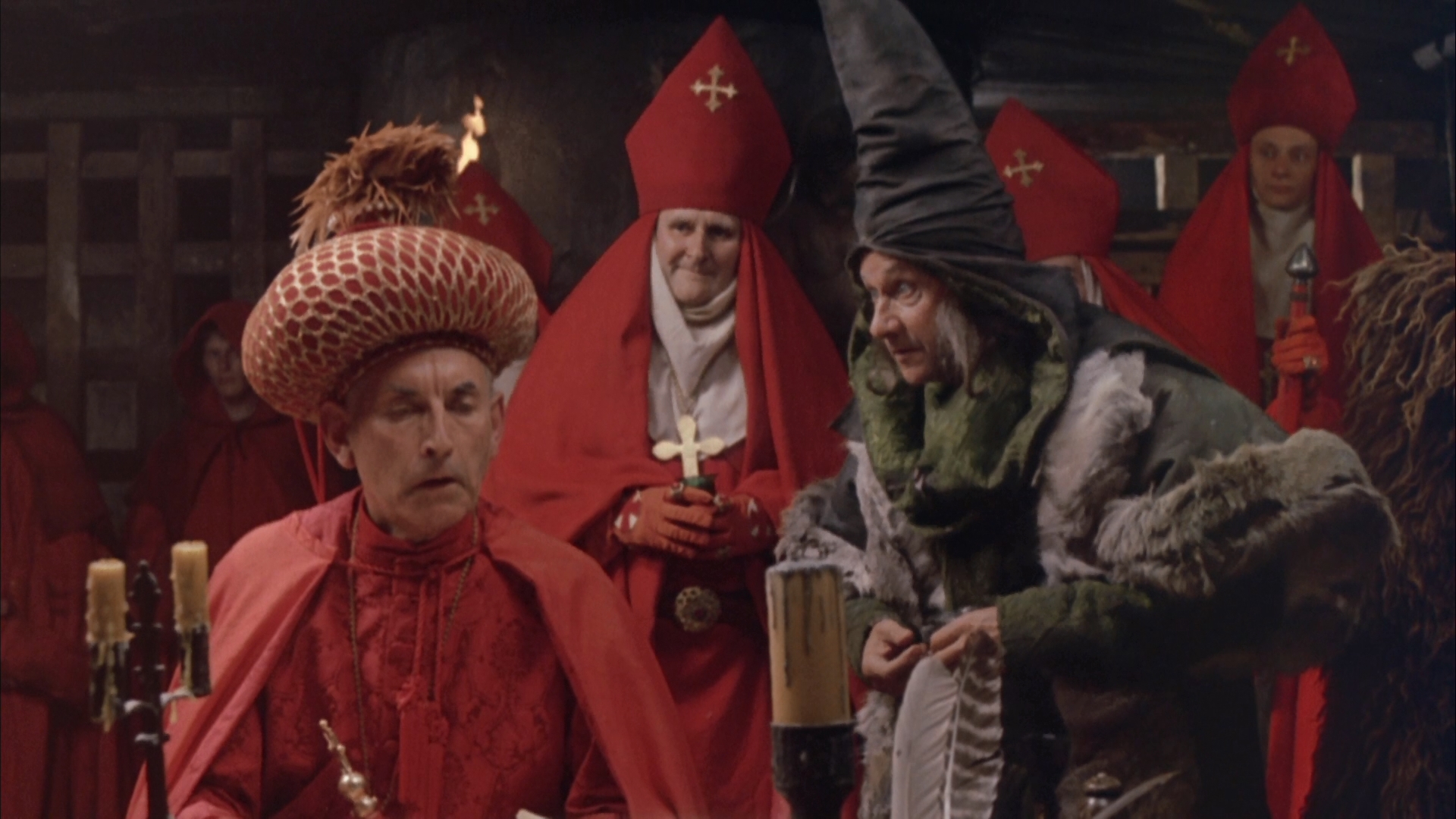 on the
on the 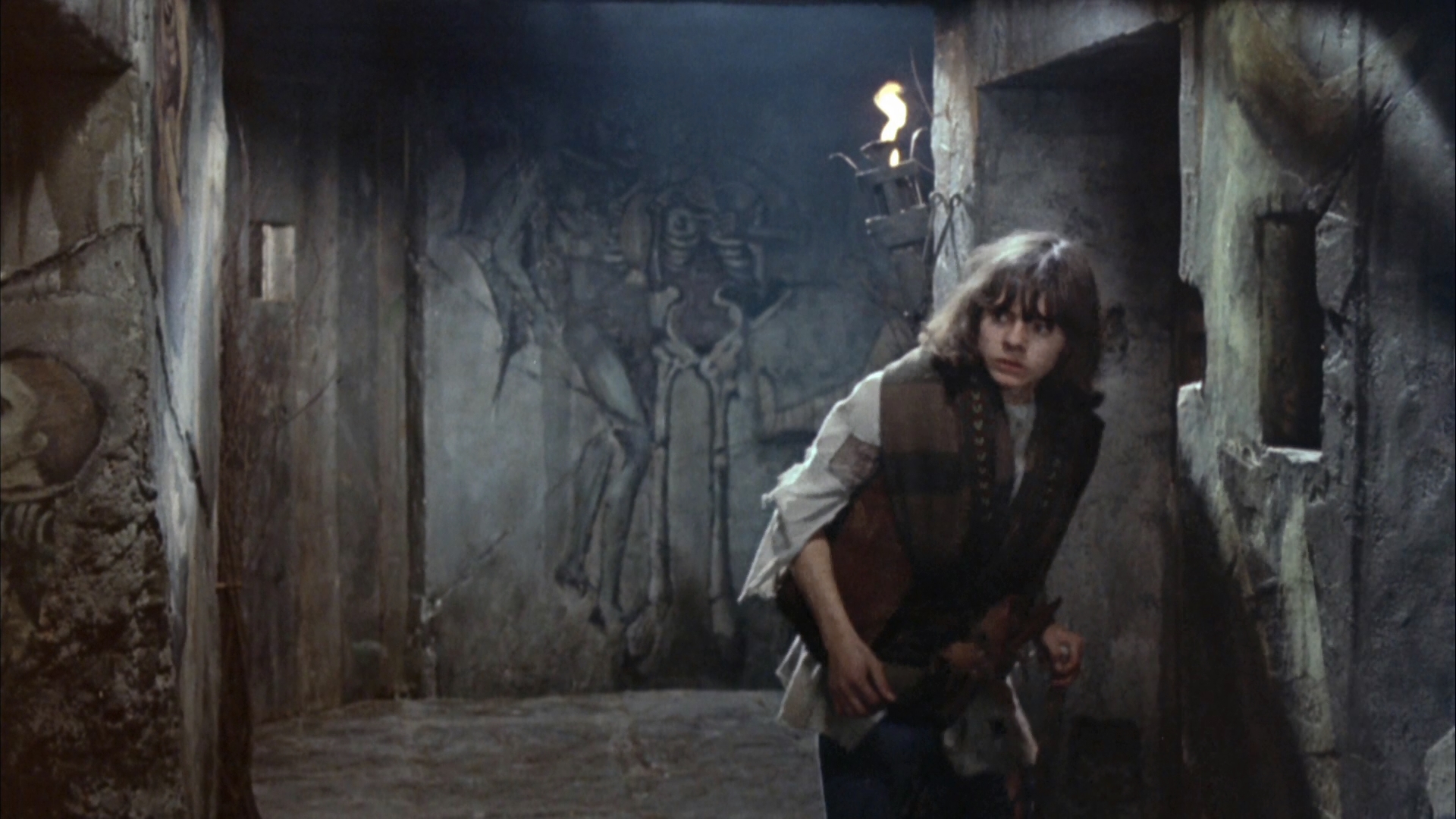 poisonous relationship between politics and religion. In fact, this film is a perfect example of the mainstream fallout from the notoriously violent cinematic year of 1971, which found such brutal offerings as A Clockwork Orange, Straw Dogs and Macbeth invading theaters around the world. This one may not be as graphic, but this is easily the grittiest and most brutal live-action "children's" film until it was eventually usurped by Dragonslayer.
poisonous relationship between politics and religion. In fact, this film is a perfect example of the mainstream fallout from the notoriously violent cinematic year of 1971, which found such brutal offerings as A Clockwork Orange, Straw Dogs and Macbeth invading theaters around the world. This one may not be as graphic, but this is easily the grittiest and most brutal live-action "children's" film until it was eventually usurped by Dragonslayer.
Though it was widely distributed by Paramount, The Pied Piper only did marginal business and disappeared from circulation almost immediately. It rarely appeared on television and became known primarily through word of mouth, and a fleeting Japanese laserdisc release was its only home video edition for three decades. Nevertheless, public curiosity continued to mount as Demy underwent a significant critical reappraisal and 35mm screenings started to pop up in 2007. Paramount's aversion to sublicensing its films to other companies eventually took a welcome turn as it began shopping out its back catalog of unreleased titles, with Legend Films snagging some key cult films to be issued in brand new anamorphic transfers. Incredibly, The Pied Piper was one of the first to make it out of the gate in 2008, and the results are quite satisfying all around in terms of the presentation. The DVD itself is bare bones, but the transfer looks respectable enough (though the opening titles have always had a dupey-looking quality-don't let those first three minutes fool you). Demy's trademark aesthetic concerns are still in evidence here, from the integration of songs into the narrative to the bittersweet 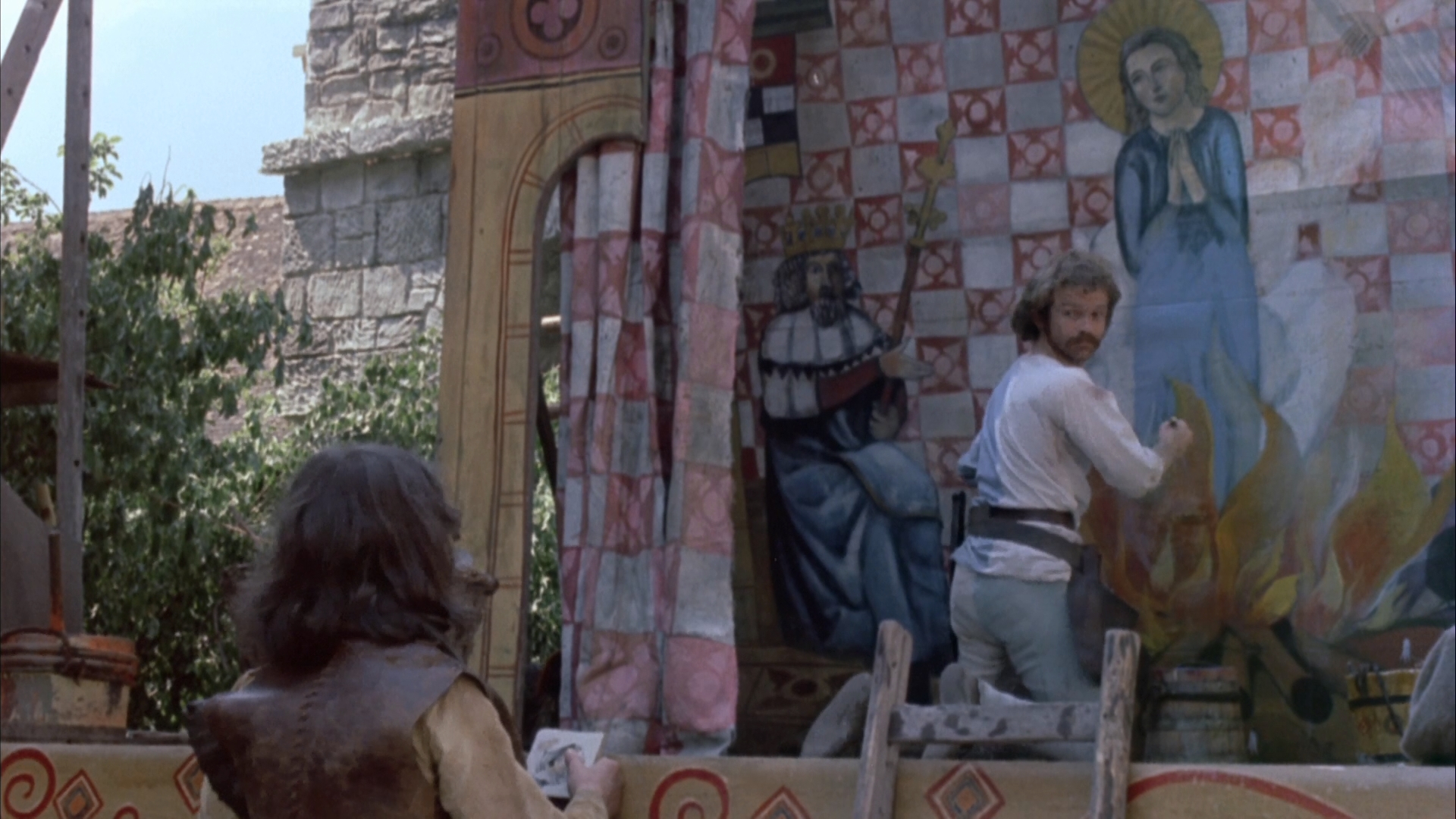 and ultimately unrequited romance at its core which forms the basis of the haunting final shots. The same transfer was used for the mammoth Demy French box set release
and ultimately unrequited romance at its core which forms the basis of the haunting final shots. The same transfer was used for the mammoth Demy French box set release 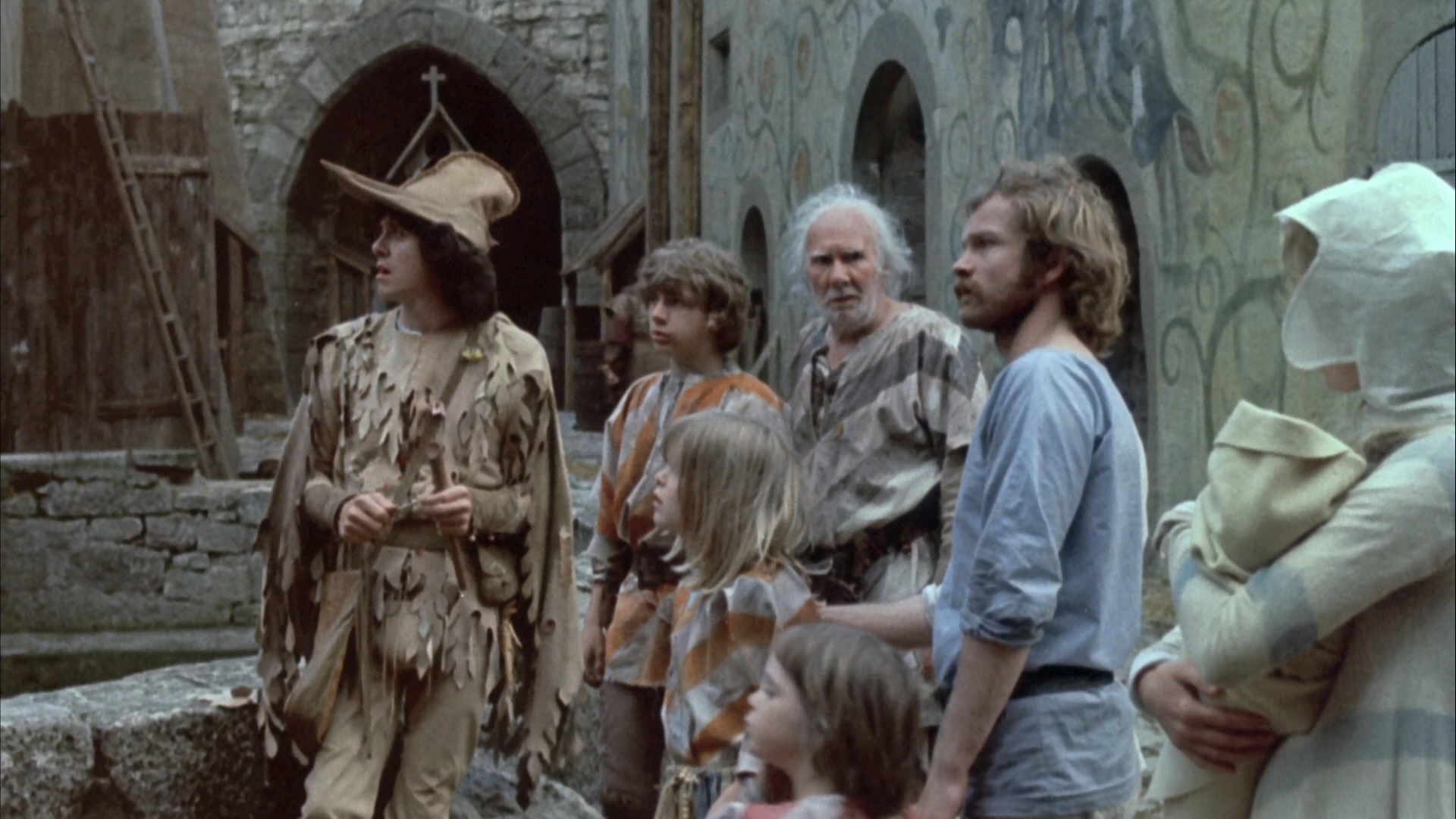 and augmented with a poster gallery, a video commentary featurette with Valentin Vignet (Demy's granddaughter), the alternate French audio track for the curious, and a five-minute B&W sequence from the program Le journal du cinema with Demy discussing the film; it's an essential title in either form.
and augmented with a poster gallery, a video commentary featurette with Valentin Vignet (Demy's granddaughter), the alternate French audio track for the curious, and a five-minute B&W sequence from the program Le journal du cinema with Demy discussing the film; it's an essential title in either form.
In 2017, long after the title went out of circulation from Legend, Kino Lorber brought it back in separate Blu-ray and DVD editions; as before, it's no frills, though you do get bonus trailers for a trio of much lighter fare (A Funny Thing Happened on the Way to the Forum, After the Fox, and The Adventures of Sherlock Holmes' Smarter Brother). The film also boasts optional English subtitles for the first time, a nice touch, and the DTS-HD MA English mono audio sounds fine given that the original source isn't tremendously dynamic. Even in 35mm the film has a rather soft and muted appearance, and that's carried over here; detail does improve and the frequent bright red costumes are more clearly resolved, though the appearance overall is limited to the original Paramount source with some baked-in debris visible during the opening and closing credits (which also reveal that this film was framed to be shown matted down quite a bit wider if necessary, also explaining the large amount of headroom seen throughout the film). A subsequent, significantly superior restoration performed in France turned up later on The Criterion Channel, though that version has yet to get a physical media release.
Reviewed on April 29, 2017




 After the rousing success of his lavish musical fairy tale Donkey Skin, director Jacques Demy, helmer of the beloved The Umbrellas of Cherbourg, decided to take another crack at children's fantasy, this time in English. The Pied Piper, his adaptation of one of the most disturbing fairy tales pulls no punches with the source material, depicting a small medieval German town of Hamelin, the threat of a nearby plague terrifies the populace, particularly the dominant forces of the Catholic church. A traveling troupe of actors arrives at the barricaded town, which allows them in only after one of their party, a vagabond piper (Donovan), revives the mayor's ailing daughter, Lisa (Harrison), with a song heard through her bedroom window. However, their troubles are only beginning as the sniveling burgomaster (Pleasence) and his corrupt and irresponsible military-aspiring son Franz (Hurt) perform underhanded deals with the church to establish a papal-sanctioned war and a completely indulgent church based out of the town. On the other side of the moral spectrum, alchemist Melius (Hordern) and his artistic, crippled young assistant, Gavin (Oliver!'s Wild), become friendly with the actors. Gavin is nursing a crush on Lisa, who, despite having yet to reach adolescence, is engaged to marry Franz. When Lisa's doomed wedding arrives and the eventual influx of infected rats arrives, the powers that be arrange an unusual bargain with the piper which, as all fairy tale lovers know, is destined to end on a very melancholy note.
After the rousing success of his lavish musical fairy tale Donkey Skin, director Jacques Demy, helmer of the beloved The Umbrellas of Cherbourg, decided to take another crack at children's fantasy, this time in English. The Pied Piper, his adaptation of one of the most disturbing fairy tales pulls no punches with the source material, depicting a small medieval German town of Hamelin, the threat of a nearby plague terrifies the populace, particularly the dominant forces of the Catholic church. A traveling troupe of actors arrives at the barricaded town, which allows them in only after one of their party, a vagabond piper (Donovan), revives the mayor's ailing daughter, Lisa (Harrison), with a song heard through her bedroom window. However, their troubles are only beginning as the sniveling burgomaster (Pleasence) and his corrupt and irresponsible military-aspiring son Franz (Hurt) perform underhanded deals with the church to establish a papal-sanctioned war and a completely indulgent church based out of the town. On the other side of the moral spectrum, alchemist Melius (Hordern) and his artistic, crippled young assistant, Gavin (Oliver!'s Wild), become friendly with the actors. Gavin is nursing a crush on Lisa, who, despite having yet to reach adolescence, is engaged to marry Franz. When Lisa's doomed wedding arrives and the eventual influx of infected rats arrives, the powers that be arrange an unusual bargain with the piper which, as all fairy tale lovers know, is destined to end on a very melancholy note. 
 big name in this particular film is Donovan, a Scottish folk-pop singer best known for 1960s standards like "Hurdy Gurdy Man," "Atlantis," and "Sunshine Superman." His presence in the film is something of a sticking point for many modern viewers, but in fact the small numbers of spare, haunting ditties he performs in the film work well with the period setting, and while he'll never be confused with a master thespian, he acquits himself well enough with his one-dimensional role. (As with his previous English film, Model Shop, Demy did not use regular composer Michel Legrand, but the music here is still very potent and deserves a soundtrack release someday. ) The real acting demands rest with pros like Pleasence, Hurt, and Hordern, who chew into their meaty roles with gusto.
big name in this particular film is Donovan, a Scottish folk-pop singer best known for 1960s standards like "Hurdy Gurdy Man," "Atlantis," and "Sunshine Superman." His presence in the film is something of a sticking point for many modern viewers, but in fact the small numbers of spare, haunting ditties he performs in the film work well with the period setting, and while he'll never be confused with a master thespian, he acquits himself well enough with his one-dimensional role. (As with his previous English film, Model Shop, Demy did not use regular composer Michel Legrand, but the music here is still very potent and deserves a soundtrack release someday. ) The real acting demands rest with pros like Pleasence, Hurt, and Hordern, who chew into their meaty roles with gusto.  on the
on the  poisonous relationship between politics and religion. In fact, this film is a perfect example of the mainstream fallout from the notoriously violent cinematic year of 1971, which found such brutal offerings as A Clockwork Orange, Straw Dogs and Macbeth invading theaters around the world. This one may not be as graphic, but this is easily the grittiest and most brutal live-action "children's" film until it was eventually usurped by Dragonslayer.
poisonous relationship between politics and religion. In fact, this film is a perfect example of the mainstream fallout from the notoriously violent cinematic year of 1971, which found such brutal offerings as A Clockwork Orange, Straw Dogs and Macbeth invading theaters around the world. This one may not be as graphic, but this is easily the grittiest and most brutal live-action "children's" film until it was eventually usurped by Dragonslayer.  and ultimately unrequited romance at its core which forms the basis of the haunting final shots. The same transfer was used for the mammoth Demy French box set release
and ultimately unrequited romance at its core which forms the basis of the haunting final shots. The same transfer was used for the mammoth Demy French box set release  and augmented with a poster gallery, a video commentary featurette with Valentin Vignet (Demy's granddaughter), the alternate French audio track for the curious, and a five-minute B&W sequence from the program Le journal du cinema with Demy discussing the film; it's an essential title in either form.
and augmented with a poster gallery, a video commentary featurette with Valentin Vignet (Demy's granddaughter), the alternate French audio track for the curious, and a five-minute B&W sequence from the program Le journal du cinema with Demy discussing the film; it's an essential title in either form. ![]()